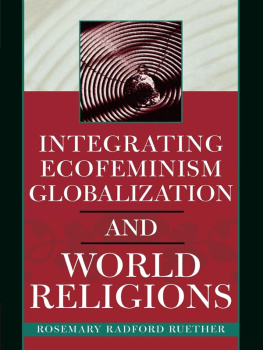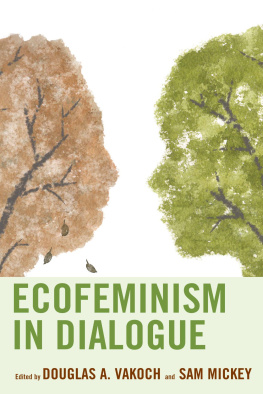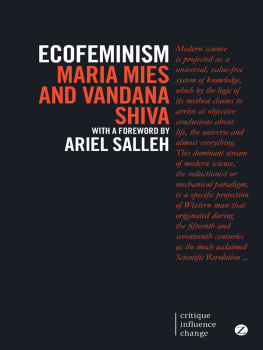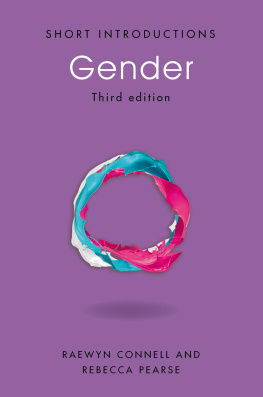First published 1997
by Routledge
Published 2016 by Routledge
2 Park Square, Milton Park, Abingdon, Oxon OX14 4RN
711 Third Avenue, New York, NY, 10017, USA
Routledge is an imprint of the Taylor & Francis Group, an informa business
Copyright 1997 by Nol Sturgeon
All rights reserved. No part of this book may be reprinted or reproduced or utilized in any form or by any electronic, mechanical or other means, now known or hereafter invented, including photocopying and recording, or in any information storage or retrieval system, without permission in writing from the publisher.
Library of Congress Cataloging-in-Publication Data
Sturgeon, Nol, 1956
Ecofeminist natures: race, gender, feminist theory, and political action / Nol Sturgeon
p. cm.
Includes bibliographic references and index.
1. Ecofeminism. I. Title.
HQ1233.S781997
305.4201dc20
96-41479
CIP
ISBN 13: 978-0-415-91249-5 (hbk)
ISBN 13: 978-0-415-91250-1 (pbk)
At the end of a long project that has taken many more years than I could have imagined to complete, its hard to thank everyone that has contributed. Id like to start by thanking all of the activists with whom I have been engaged in the antimilitarist, feminist, and ecofeminist movements. Without a chance to work, sing, do civil disobedience, argue, laugh, and cry with them, this project would never have been conceived, let alone completed. I have been sustained throughout by the promise of such actions, and I hope this book adds something to these and other future activist projects.
Some of the ideas and arguments found in this book were based on my dissertation and were generated from within the intellectual and political community I encountered while attending the History of Consciousness Board of Studies at the University of California, Santa Cruz. For making my graduate experience there so stimulating and rewarding, I thank Don Beggs, Elizabeth Bird, Caren Kaplan, Gregory Calvert, Rennie Cantine Crystal (Chris Hables Gray), Jim Clifford, Giovanna Di Chiro, Barbara Epstein, Ilene Rose Feinman, Ruth Frankenberg, Marge Frantz, Debbie Gordon, Donna Haraway, Jackrabbit (Steven Mentor), Katie King, Hilary Klein, Lisa Lowe, Lata Mani, Helene Moglen, Alvina Quintana, T.V. Reed, Zo Soufoulis, Chela Sandoval, Jack Schaar, Barry Schwartz, Andrew Walzer, and Hayden White.
As this project has evolved, portions of it have been presented at conferences and read in different stages by generous and critical readers. I thank the audiences at numerous conferences for their comments, and I am deeply appreciative of various readings of my work at various stages by Elizabeth Bird, Elizabeth Carlassare, Greta Gaard, Julie Graham, Donna Haraway, Chaia Heller, Deborah Haynes, Val Jenness, Susan Kilgore, Hilary Klein, Katie King, Ynestra King, T.V. Reed, Virginia Scharff, Frances Jones Sneed, Zo Soufoulis, Andrew Stewart, Jude Todd, Anna Tsing, Karen Warren, and Linda Zerrelli.
Two University of California Regents Fellowships and one University of California Research Fellowship allowed me to lay the groundwork for important parts of this work. Grants I received from the University of California Institute for Global Conflict and Cooperation supported two years of participant-observation in the antimilitarist direct-action movement, most reflected in . A Washington State University Research grant supported participant-observation in the ecofeminist movement and interviews conducted during 19931994. A Rockefeller Fellowship brought me to the Center for the Critical Analysis of Contemporary Culture at Rutgers University for a year of exciting, challenging, and incredibly productive work. I thank Joan Burbick, Donna Haraway, and Karen Warren for supporting my application to CCACC. For that important experience, I would like to thank John McClure, Bruce Robbins, George Levine, Link Larsen, and all the members of the 199495 Colloquium, entitled Environments in the Public Sphere, especially my fellow Fellas, Julie Graham, Michael Moon, and Maara Seppanen. Neil Smith, Cindi Katz, Dorothy Hodgson, and Richard Schroeder were supportive friends, stimulating conversationalists, and knowledgeable resources. I especially thank Neil and Cindy for letting me house-sit when I most needed a space to work (especially since it allowed me to raid their home library!).
Much of my thinking about ecofeminism in transnational politics was formulated during my participation in Joan Scotts feminist theory seminar at the Institute for Advanced Study, Princeton University, January to May 1995, and in the Transitions, Environments, Translations: The Meaning of Feminism in Contemporary Politics conference, at the Institute for Research on Women, Rutgers University and the Institute for Advanced Study, Princeton University, New Jersey, April 1995. I thank Joan and Cora Kaplan for making my participation in these events possible. Of my colleagues in the seminar and conference (all of whom were important influences in one way or another), Id like to single out Anna Tsing and Yaakov Garb for special thanks. They were particularly helpful and influential for me, and I owe them a large debt for shared materials, engaging debates, and insightful critiques. Bina Agarwal was a challenging and gracious interlocutor. Rosi Braidotti was also an inspiration, and her expressions of solidarity with what she saw as my deconstructive ecofeminist project meant a great deal to me.
The faculty, students, and staff at the Womens Studies Program at Washington State University have been central to the writing of this book. I thank Sue Armitage, Chris Bergum, Linda Siebert, Patti Gora, Marian Sciachitano, Nancy Keifer, Gail Stearns, Meera Manvi, Judy Meuth, Kendal Broad, Bonnie Frederick, Jennifer Giovi, Wendy Mason, and Reis Pearson for all their help and support. Linda Siebert deserves special thanks for all her hard work in helping this book become a possibility. Ednie Garrison, in her work and in her person, usefully reminded me of the way in which generational tensions affect the history of feminism. Petra Uhrig, Kari Norgaard and Katrine Barber provided excellent research assistance and enlightening conversation about ecofeminism. My tenure review committee (Sue Armitage, Joan Burbick, Bonnie Frederick, Linda Stone, and Gerald Young) was a source of firm support and needed advice. To Jo Hockenhull, my director, I owe endless thanks for her guidance, her example, her protection, and her willingness to fight for me.
I thank Cecelia Cancellaro for having such firm initial faith in this project. At Routledge, Claudia Guerelick, Jeanne Park, Karen Deaver, Laura Ann Robb, Lynette Silva, and Melissa Rosari were patient and supportive. I also thank my anonymous copyeditor for a thorough and immensely helpful editing job; any obscurity remaining in my text is a result of my refusing her excellent advice. Karen Weathermon deserves immense gratitude for putting together such an excellent index under sometimes trying circumstances. I thank the Association for Philosophy Newsletter on Feminism and Philosophy; International Books; Indiana University Press; and Womens Environment and Development Organization for permission to use previously published material.







